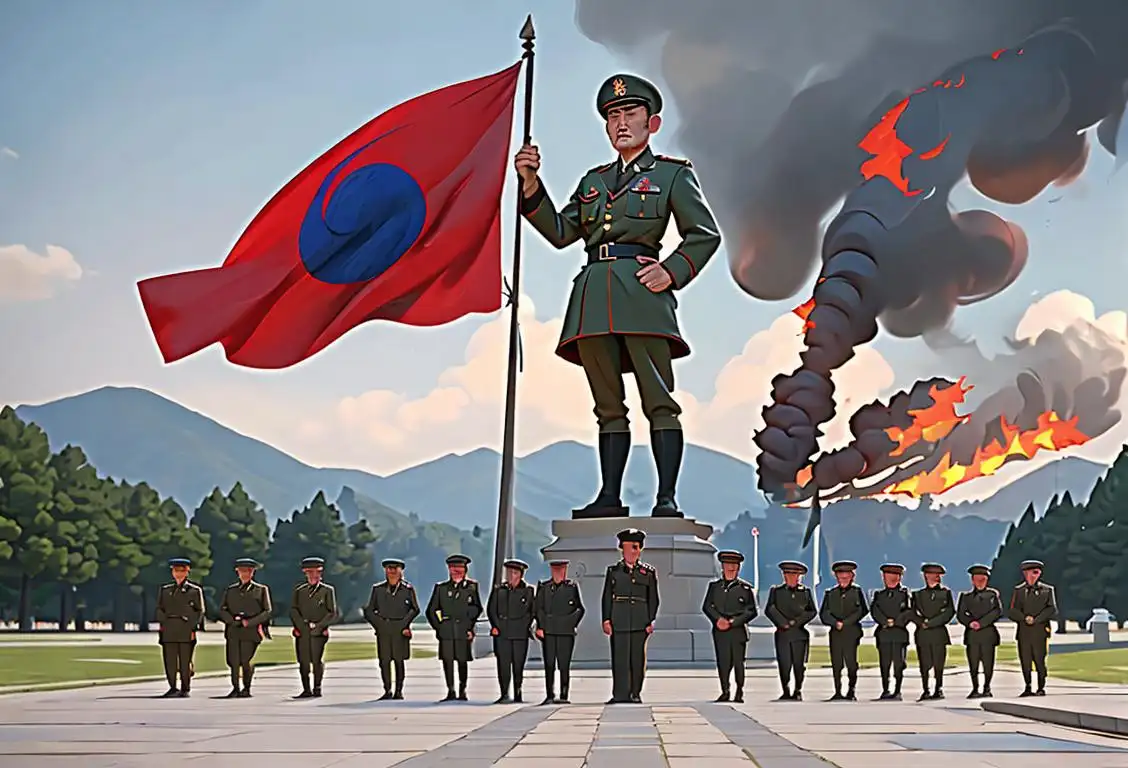National Korean War Armistice Day

Happy National Korean War Armistice Day! Today we commemorate the end of one of the most significant conflicts in modern history. It's a day filled with somber remembrance, but also a reminder of the resilience and bravery of those involved in the Korean War. Let's delve into the internet and national history of this day and honor the sacrifices made.
When is Korean War Armistice Day?
It's national korean war armistice day on the 27th July.
The Internet History of National Korean War Armistice Day
On National Korean War Armistice Day, we take a moment to reflect on the impact of this conflict and how it shaped the world we live in. The internet has played a crucial role in preserving the history and memories associated with the Korean War.
In this digital age, countless websites, articles, and forums provide a wealth of information about the war and the armistice that marked its end. From official historical records to personal accounts of veterans, the internet allows us to dive deep into the experiences of those who fought and the global impact of the Korean War.
Online communities dedicated to the Korean War provide a space for veterans and their families to connect, share stories, and find support. These platforms offer a sense of camaraderie and understanding for those who lived through this tumultuous period in history.
The National History of National Korean War Armistice Day
National Korean War Armistice Day is observed annually on July 27th to commemorate the signing of the armistice agreement that ended the Korean War in 1953. The war, often called the 'Forgotten War,' was a conflict between North Korea (supported by China and the Soviet Union) and South Korea (supported by a United Nations coalition led by the United States).
The armistice agreement effectively ended the fighting and established a ceasefire line, also known as the Korean Demilitarized Zone (DMZ). However, it did not officially end the war, as a formal peace treaty was never signed. To this day, tensions remain between North and South Korea, making the armistice an important symbol of the fragile peace in the region.
Did You Know?
Did you know that the Korean War was the first military clash of the Cold War era? It lasted for three years, resulted in millions of casualties, and greatly intensified the geopolitical conflict between the United States and the Soviet Union. The Korean War had a lasting impact on the world stage, shaping international relations and influencing subsequent conflicts.
History behind the term 'Korean War Armistice'
1950
Outbreak of the Korean War
The Korean War broke out on June 25, 1950, when North Korean forces invaded South Korea. This hostile act marked the beginning of a brutal conflict that would endure for three years. The war resulted from a power struggle between the communist North and the capitalist South, and quickly escalated into a full-scale international war with the involvement of the United States and other countries.
1951
Stalemate and Negotiations Begin
In 1951, the Korean War reached a stalemate as both sides were unable to achieve a decisive victory. As a result, negotiations for an armistice began. The discussions were held at Panmunjom, a village located in the demilitarized zone between North and South Korea. The armistice talks faced numerous obstacles, including disagreements over the demarcation line and the repatriation of prisoners of war.
1953
Signing of the Korean War Armistice
After two years of intense negotiations, the Korean War Armistice was signed on July 27, 1953. The armistice agreement effectively ended the active combat of the war and established a ceasefire between North and South Korea. The demilitarized zone, a buffer area separating the two countries, was created along the 38th parallel. The armistice, however, did not officially end the war, as a formal peace treaty was never signed.
2018
Ongoing Consequences and Calls for Peace
Despite the armistice, the Korean War technically continues to this day, with North and South Korea remaining divided. Over the years, there have been numerous calls for a permanent peace agreement to replace the armistice. In 2018, an important step was taken towards peace when the leaders of North and South Korea, Kim Jong-un and Moon Jae-in, met and agreed to work towards a peace treaty. The process of achieving a lasting peace on the Korean Peninsula is still ongoing.
Did you know?
The Korean War was the first military clash of the Cold War era.Tagged
awareness rememberanceFirst identified
27th July 2017Most mentioned on
27th July 2020Total mentions
44Other days
Voters Day
Unemployed Day
Suicide Prevention Day
Cancer Survivors Day
Memorial Day
Bestfriends Day
Heroes Day
Liberation Day
Pumpkin Day
Gymnastics Day









